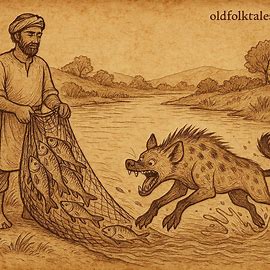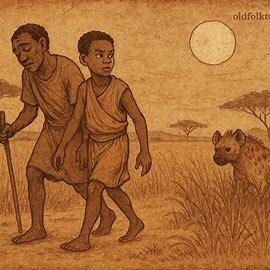Long ago, among the Bakongo people of the Democratic Republic of Congo, two proud birds, the Owl and the Kingfisher, sat in dispute over a question of endurance. The Kingfisher, sleek and brightly feathered, boasted of his swiftness and strength. The Owl, solemn and watchful with his wide golden eyes, claimed that wisdom and patience made him stronger than any other creature. Their argument grew so heated that at last the Owl declared, “Let us settle this with a contest. We shall see which of us can go the longest without food.”
The Kingfisher tilted his sharp beak in agreement. “How long shall the trial last?” he asked.
“Ten days,” replied the Owl firmly.
“Very well,” said the Kingfisher. “Let us begin.”
To make the challenge fair, they tied a rope across a quiet stream that flowed through the forest. At dawn they perched side by side on the rope, gazing into the shimmering water below. The fish darted beneath them in flashes of silver, but neither bird moved, for they had sworn to resist temptation.
For the first two days, both held strong. The Owl remained still, his heavy eyelids blinking slowly as he repeated to himself, Patience will win. Patience will win. The Kingfisher, however, grew restless. By the third day his stomach ached with hunger. His eyes, sharper than the Owl’s, noticed a fat fish gliding just beneath their perch.
Cunning filled his mind. The Kingfisher let his body sway and suddenly dropped from the rope with a splash. In an instant he caught the fish in his beak, swallowed it, and then flapped back to the rope. With a pitiful cry he called out, “Oh, Uncle Owl! Forgive me, my head grew dizzy, and I tumbled into the stream. Had it not been for my wings, I would have drowned.”
READ: Tunga and the Squirrel : A Bakongo Folktale from the Democratic Republic of Congo
The Owl, too drowsy and trusting to suspect trickery, nodded gravely. “Never mind, nephew. Let us persevere with our contest.”
The Kingfisher smirked inwardly. His hunger eased, he sat comfortably while the Owl still struggled. Yet temptation returned quickly. On the fourth day, another fish passed below. Again, the Kingfisher feigned a dizzy spell, fell, seized the fish, and returned to the rope shaking his feathers. “Oh, Uncle! Another fit! The stream nearly carried me away.”
The Owl, unaware of the gleam of fish scales on the Kingfisher’s beak, sighed. “We must not give up. Only the patient shall endure.”
So, the days dragged on. The Kingfisher’s giddy fits became more frequent, always when fish swam beneath him, but the Owl’s half-sleeping eyes saw nothing. He grew thinner and weaker with each passing day. His feathers clung tightly to his frame, and his wings lost their strength. Still, he whispered stubbornly, Patience will win.
By the ninth day, the Owl was but a shadow of himself. His claws, once sharp and strong, slipped upon the rope. His head drooped with weariness. The Kingfisher, meanwhile, was plump and lively, his belly full of fish. He chuckled quietly to himself as his rival swayed unsteadily.
At last, the tenth day arrived. With a final effort, the Owl tried to hold his place, but his strength had vanished. His body slipped from the rope, and he plunged into the water. The current swallowed him, and he drowned, betrayed by both hunger and misplaced trust.
The Kingfisher, victorious yet deceitful, spread his wings and flew away. He left the stream behind, leaving his dead rival floating in silence, never to rise again.
Moral Lesson
This Bakongo folktale teaches that deceit, no matter how clever, carries a heavy price. The Kingfisher may have won the contest, but his victory was hollow, built not on strength or wisdom, but on lies. The Owl’s stubbornness and blindness to trickery brought him ruin, showing that trust must be tempered with discernment. The story warns against pride and dishonesty: true endurance is found not in trickery, but in honesty and fairness.
Knowledge Check
Q1: Who were the two main characters in this Bakongo folktale?
A1: The Owl and the Kingfisher, who competed in a test of endurance.
Q2: What challenge did the Owl propose to the Kingfisher?
A2: To see which of them could go the longest without food for ten days.
Q3: How did the Kingfisher secretly break the rules of the contest?
A3: He pretended to have dizzy spells, dove into the water, and ate fish.
Q4: Why did the Owl not realize he was being deceived?
A4: His sleepy eyes and trusting nature prevented him from noticing the fish.
Q5: What was the fate of the Owl at the end of the story?
A5: Weakened by hunger, he fell into the stream and drowned.
Q6: What cultural lesson does this Bakongo tale emphasize?
A6: It highlights the dangers of deceit, pride, and blind trust in competition.
Source: Bakongo folktale, Democratic Republic of Congo.







